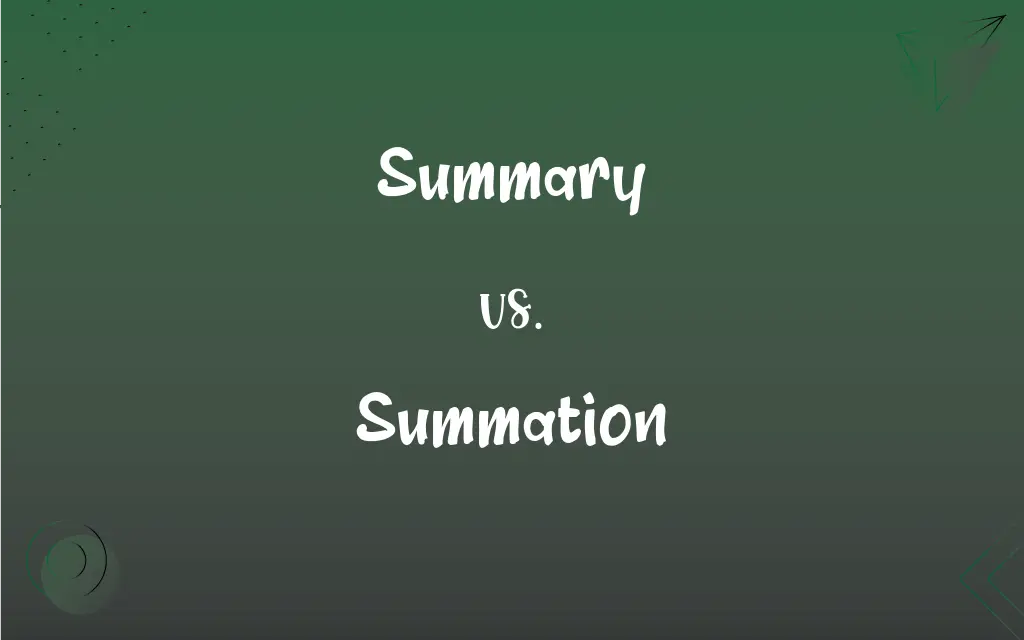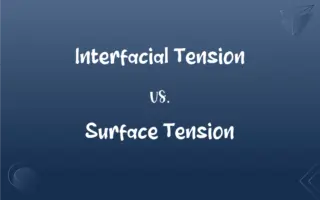Summary vs. Summation: What's the Difference?
Edited by Aimie Carlson || By Janet White || Published on February 16, 2024
Summary is a concise statement or account covering the main points of a text, document, speech, etc. Summation is the act of adding things together to form a total, or the final part of an argument or speech.

Key Differences
Summary involves condensing content to highlight key points, usually of a narrative or detailed document. Summation often refers to the process of adding up numerical values or presenting the final part of an argument.
A summary is used to encapsulate the main ideas of a larger body of work in a shortened form. In contrast, summation can be the final, concluding part of a discourse, focusing on synthesizing arguments or points presented.
In academic or professional contexts, a summary provides a brief overview of a topic or text, maintaining the original intent and key elements. Summation in a legal context, for instance, refers to the final argument in a court case, designed to consolidate and reinforce the points made.
The objective of a summary is to simplify and provide a digestible version of complex information. The goal of summation, especially in mathematics, is to calculate a total, or in rhetoric, to provide a compelling final argument.
Summary is often used in everyday language to describe a brief version of a story, event, or information. Summation is more formal and specific, commonly used in legal, mathematical, or rhetorical contexts.
ADVERTISEMENT
Comparison Chart
Definition
A brief account highlighting main points
Adding up to a total; final part of argument
Context
Narrative, documents, speeches
Mathematics, legal arguments
Purpose
Simplification, overview
Calculation, conclusion
Usage
Common in everyday language
Formal, specific contexts
Key Focus
Main ideas, essence of content
Totalization, final arguments
ADVERTISEMENT
Summary and Summation Definitions
Summary
Overview capturing essential information.
His report included a summary of the meeting's discussions.
Summation
Concluding section synthesizing points made.
His speech ended with a powerful summation.
Summary
An abstract of the main ideas.
The book's back cover had a summary of the plot.
Summation
The act of totaling numerical values.
The accountant completed the summation of expenses.
Summary
A brief statement of the main points.
She provided a summary of the article's key arguments.
Summation
Mathematical process of adding numbers.
The summation of these figures gives us the final result.
Summary
Condensed version of a longer text.
The teacher asked for a summary of the chapter.
Summation
Final part of an argument or speech.
The lawyer's summation was persuasive in court.
Summary
A succinct representation of content.
The executive summary highlighted the proposal's benefits.
Summation
Culmination of presented ideas or arguments.
The debate concluded with a clear summation of key points.
Summary
A brief statement mentioning the main points of something
A summary of our findings.
Summation
The act or process of adding; addition.
Summary
Prose that provides information in a condensed format, as by mentioning only the most significant details of a narrative
The novelist did not like writing dialogue and preferred to write stories in summary.
Summation
A sum or aggregate.
FAQs
When is a summary used?
To provide an overview or a brief version of a longer content.
What is a summary?
A condensed version of a text or presentation focusing on main points.
What is the purpose of summation in mathematics?
To calculate the total of a series of numbers.
What is a summation?
Either the act of totaling numbers or the concluding part of a speech or argument.
Should a summary be objective?
Yes, it should objectively represent the main points of the source material.
Who uses summaries?
Students, professionals, readers, anyone needing a concise version of longer content.
How long should a summary be?
Significantly shorter than the original text, highlighting only main points.
Can a summary include details?
It includes key details but omits less important information.
Can a summary change the meaning of the original text?
It should not; a good summary maintains the original intent.
Is summation always numeric?
No, it can also refer to the concluding part of a discourse.
How is summation used in rhetoric?
As the final part of a speech to reinforce the speaker's message.
Do summaries include personal opinions?
Typically, no, summaries are objective.
Why are summaries important in academics?
They help students grasp essential points and synthesize information.
Can summation be part of a summary?
Yes, especially if summarizing an argument or discussion.
What's the role of summation in a court case?
To conclude and reinforce the arguments made by each side.
How does summation relate to conclusion?
Summation is often synonymous with the concluding part of an argument.
Is a summary always written?
It can be written or oral, depending on the context.
What's the difference in context for summary vs. summation?
Summary is broadly used across various fields, while summation is more specific to math and rhetoric.
What skills are needed to make a summation?
Analytical skills for mathematics; persuasive skills for arguments.
Can a summary be for an entire book?
Yes, summaries can be for books, articles, films, etc.
About Author
Written by
Janet WhiteJanet White has been an esteemed writer and blogger for Difference Wiki. Holding a Master's degree in Science and Medical Journalism from the prestigious Boston University, she has consistently demonstrated her expertise and passion for her field. When she's not immersed in her work, Janet relishes her time exercising, delving into a good book, and cherishing moments with friends and family.
Edited by
Aimie CarlsonAimie Carlson, holding a master's degree in English literature, is a fervent English language enthusiast. She lends her writing talents to Difference Wiki, a prominent website that specializes in comparisons, offering readers insightful analyses that both captivate and inform.







































































